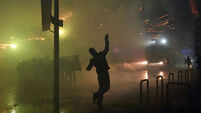Saddam hits back with global war threat
Saddam Hussein tonight warned that if Iraq were attackd, it would take the war anywhere in the world "wherever there is sky, land or water".
The Iraqi president’s threat was made during a meeting with military commanders and his remarks were carried by the official Iraqi News Agency.














